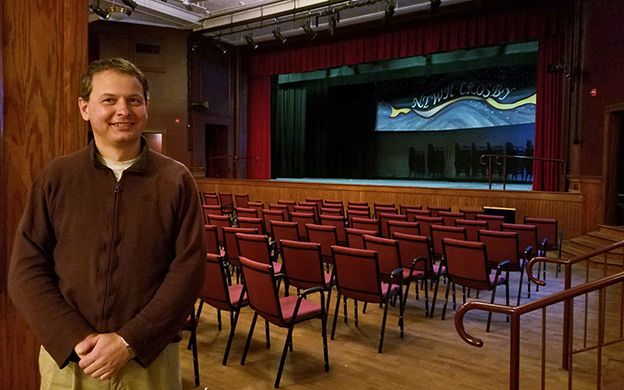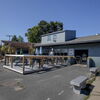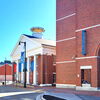Bulgarian émigré launches restoration of former Belfast school
BELFAST — An émigré from Bulgaria who’s fallen in love with Belfast purchased an old school building that he envisions as a multi-use facility for businesses and the city’s cultural community.
Kiril Lozanov purchased the former Crosby School, at 96 Church St., for an undisclosed price, in a deal that closed Dec. 30.
The 36,000-square-foot building, which dates to 1923, is situated on a one-acre site that also includes 24 parking spots. Crosby School operated until 1993. In 1996, the city of Belfast sold the building to the National Theatre Workshop of the Handicapped, which spent $3.5 million on renovations. The building has been vacant for a decade.
Lozanov said he plans to revitalize the space as a multiuse building, to include office space, a theater for musical and theatrical performances, creative spaces open to the public, cooperative rental housing and a restaurant. Although the infrastructure is in place for many of these intended uses, some restoration work is needed.
Lozanov emigrated to the United States in 1998, first to Chicago then Madison, Wisc., where he and partners started Capital City Renewables, which provides renewable energy solutions.
After a move to Belfast, he discovered the existence of the Belfast Co-Housing and Ecovillage, the 36-unit collaborative housing project where he’s since installed 12 residential solar systems.
“Belfast is beautiful,” he said. “I like Belfast a lot. I like the way it feels; I like the people.”
'A big project in my hands'
As he was exploring the city, he noticed a gorgeous brick building. It was the Crosby School. By coincidence, a friend who is a part-time actor suggested buying the building.
“He told me that even though Belfast has many performing groups, they do not have a really good place to show their performances,” Lozanov said. “He said, ‘Why don’t you buy the building and figure out a way for us to use the theater?’”
At that time, however, the building was already under contract to be sold. That sale did not go through, so Lozanov made an offer.
“So now I have a big project in my hands,” he said.
A five-year timeline for renovation
Lozanov plans to revitalize the building in phases over five years. In the coming months, he plans to renew the third-floor residential space, which was added by NTWH. There are 14 bedrooms and 12 bathrooms, with a shared kitchen, dining room, and living room. Lozanov plans to fix the plumbing and get an energy-efficient HVAC system in place so he can begin offering cooperative rental housing this spring.
“My intention is not to change it much,” he said. “I think the space will appeal to all kinds of people, but also to younger people who don’t have the finances to pay $1,000 for rent or to buy their own house.”
Subsequent work will involve fixing the roof and installing a 96-kilowatt system of solar panels, which will cover most of the roof and is expected to offset most of the building’s energy use, through the use of electric heat pumps and electric radiant floors.
“I would like this building to be energy independent and not rely on fossil fuels for heating, cooling, or lighting or for running appliances,” he said.
Lozanov plans to move his residence and office to the property. In the meantime, he also plans to work with nonprofits that would like to lease and manage different portions of the building — the theater, for example. There is available space for businesses. And the building has a commercial kitchen that he’d like to utilize with some of the space for a restaurant.
His plans call for the building to be fully operational in five years. Initially, he expects the rehab to cost between $250,000 and $500,000.












Comments